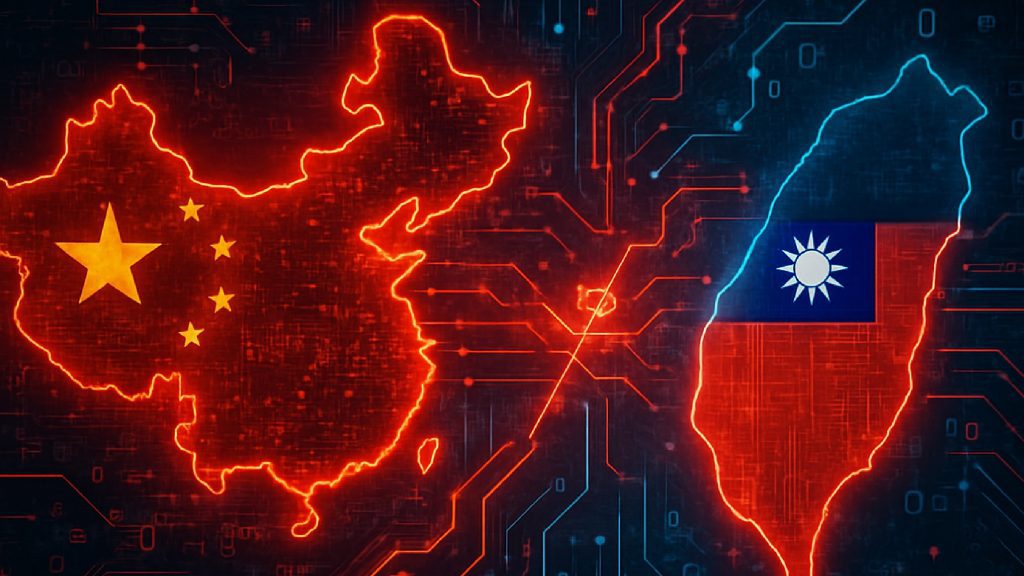
On Thursday, at a Congressional hearing in Washington, analysts highlighted how Beijing is highly likely to target Taiwan with an economic cyber war China, rather than an invasion, pleading the US to prepare for various conflict scenes, according to South China Morning Post.
Speaking to the House Select Committee on the Chinese Communist Party, retired US Rear Admiral, Mark Montgomery said, “The most likely scenario is they’re going to try this cyber-enabled economic warfare campaign,” suggesting that Beijing’s strategy is toward non dynamic pressure.
Montgomery elaborated on how China’s cyber warfare could target Taiwan’s energy, telecommunications, and financial infrastructure to paralyze the island and call for political concerns of a short of war.
It is worth noting that, this view is similar to growing suspicions that China wants to reunify Taiwan short of war by means of hybrid warfare to swipe opposition and international support in the long term.
China’s Cyber Warfare the Evolution of Strategic Doctrine
Although Taiwan remains a leading power in international tech supply chains, specifically semiconductors, its security increasingly relies on digital resilience. The Taiwanese government and the US have already begun to prepare for cyber-enabled crises.
Recent “tabletop” military exercises in Taipei simulated responses to internet outages, caused by potential undersea cable sabotage, a sign of how seriously such threats are taken today.
During these cyber war China developments, the US defense sustained efforts to include arm sales and freedom of navigation operations, which began during the Trump administrations transactional foreign policy to protect its allies.
Exposing One of China’s Cyber Espionage Units
In an in-depth investigation, cybersecurity firm Sygnia exposed a long-term breach by a China-linked group known as Weaver Ant, which infiltrated an unnamed Asian telecommunications provider for over four years.
Using advanced tolls like the China Chopper web shell and stealthy INMemory malware, Weaver Ant repeatedly accessed internal networks without getting detected.
“Using web shells and tunneling, the attackers maintained persistence and facilitated cyber espionage,” said Sygnia, adding that Weaver Ant utilized a misconfigured publicly exposed application to establish an initial foothold. The group used Hypertext Transfer Protocol (HTTP) tunneling to move, avoid detection, and access high accounts in addition to critical servers.
Hypertext Transfer Protocol (HTTP), a foundation layer in the world of the internet that is used to load webpages and hyperlinks.
The group employed methods and techniques typical of Chinese state-supported actors, including an Outlook-based backdoor linked to Emissary Panda and tactical use of Operational Relay Boxes (ORBs) to obfuscate traffic.
“Weaver Ant adapted their TTPs [tactics, techniques, and procedures] to the evolving network environment, employing innovative methods to regain access and sustain their foothold,” said Sygnia.
This incident depicts a broader trend, as China continues cyber espionage tactics on strategic infrastructure across Asia, particularly where long term access facilitates geopolitical influence. Although Beijing rejects any link, the fingerprints of the state sponsors are evident.
China Taiwan Cyber Standoff
As cyber war with China and Taiwan proliferates, alongside the economic tariffs’ policy, reducing military involvement, and requiring allies to bear more financial burdens by the Trump administration can destabilize cross-strait status even more. Taiwan could be forced to relocate semiconductor manufacturing to the US, making those assets new Chinese spying targets.
The cyber war China and strategic discouragement is a component of China’s long-term strategy to overpower Taiwan and reduce US influence in the Indo-Pacific region. The shifting dynamics of this conflict where misinformation, sabotage, and cyber warfare replace tanks and missiles signal a new era in geopolitics, one that is fought in firewalls, fiber optic cables, and the dark alleys of cyberspace.
Inside Telecom provides you with an extensive list of content covering all aspects of the tech industry. Keep an eye on our Cybersecurity sections to stay informed and up-to-date with our daily articles.